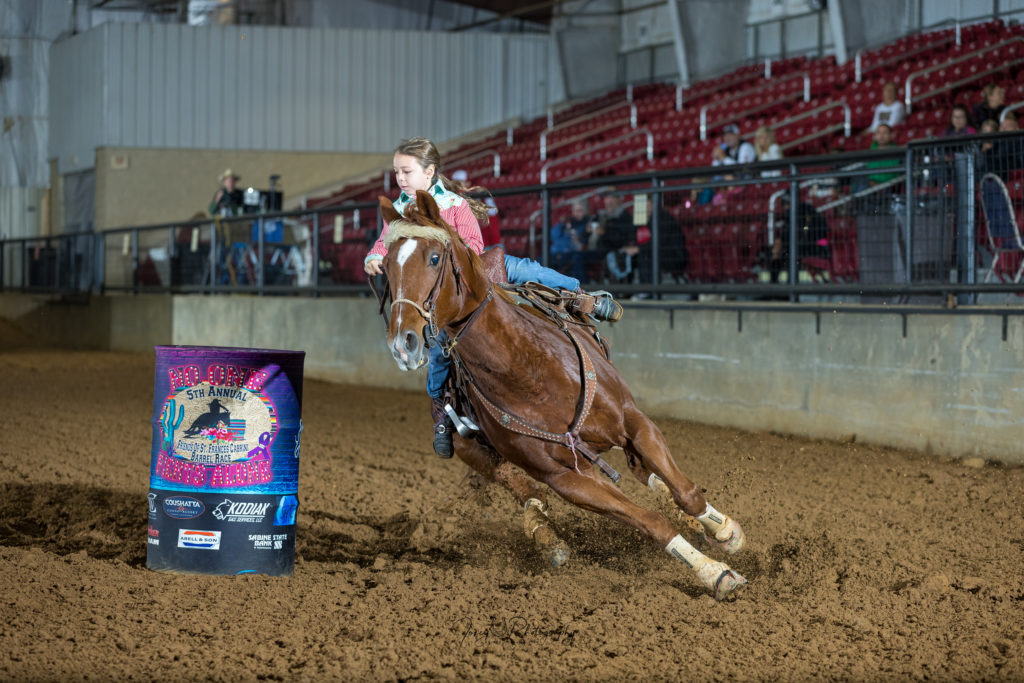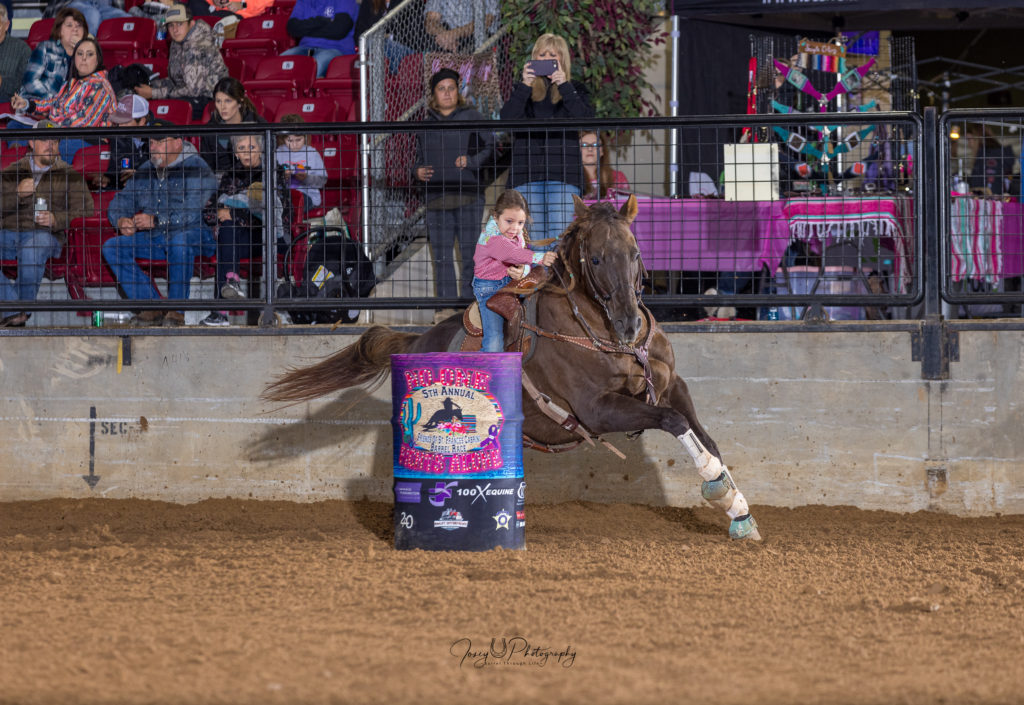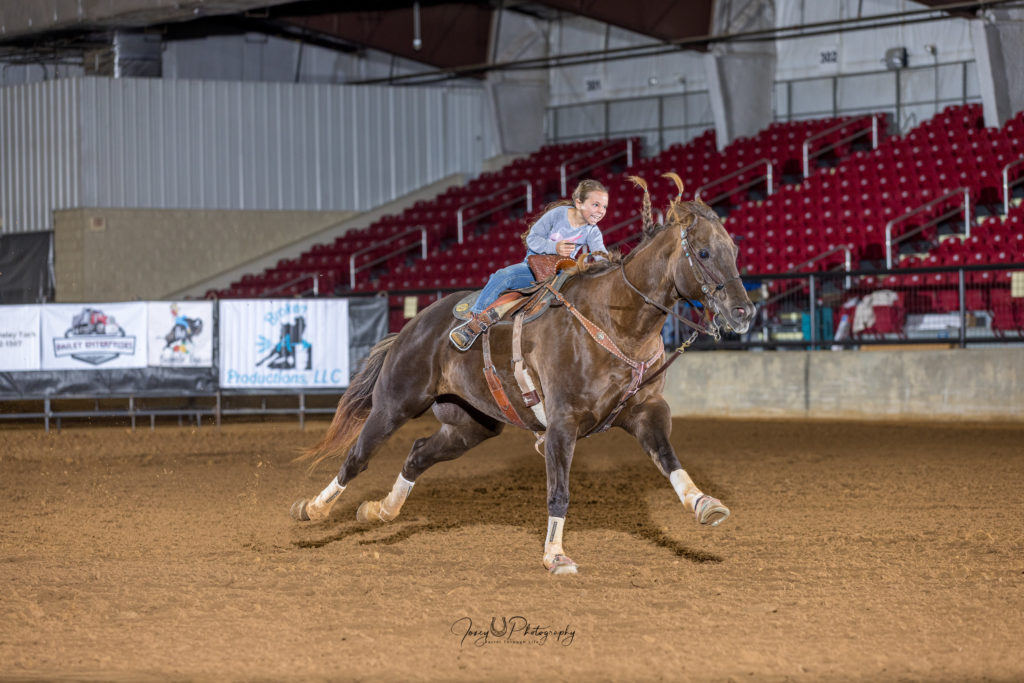Dusky Lynn Hall is the 8-year-old that has been the talk of the barrel racing world in 2022. She isn’t just winning youth races—she’s taking the adults’ money. Everywhere from the Christmas in Dixie Race in Jackson, Mississippi, where she pocketed nearly $10,000 in earnings and dominated the entire weekend, to The American Semifinals, where she punched two tickets to Cowtown Coliseum, Hall is carving out a name for herself in a cutthroat industry. Hall’s parents have lost count of the saddles, buckles, and other awards she has won in the past year, and her nearly $100,000 in earnings over the past 365 days make her appear to be an overnight sensation. However, the standout kiddo is the result of her parents’ careful upbringing and consistent effort, not just a stroke of good luck.
Dusky Lynn has been successful on multiple horses, with different bloodlines, from different trainers, and many are wondering how she has become such a talented jockey at such a young age. Her mother, Dusky Hall, had a successful youth barrel racing career as well, running on some of the biggest stages in the world before she was a teenager. Hall sat down with Barrel Racing Magazine to share what her mother, Dusky Lynn’s grandmother, taught her about the sport of barrel racing, and what she has learned through her own experiences raising two kids in the sport of rodeo.

1. Lead by example.
Dusky Lynn is known for taking exceptional care of her horses. It is an obsession for the young champion, but she had to learn those habits and principles from somewhere.
“A child will mold into the way you act,” Hall explained. “Kids follow how their parents treat animals. The more that she sees how important the horses are to her success, she will follow that example. Our horses are our life, and Dusky Lynn has always watched how much I worry about the horses.”
It’s a hard truth to swallow, but kids are masters of mimicry. If a parent is struggling with getting their child to prioritize their animals, it is often a result of observing how the adults in their life value and care for their equine athletes. Hall believes that by making sure to consistently show how important each horse is, and by loving and care for them as part of the family, a child will carry those values on for many years.

2. Watch your words.
“I don’t try to break her confidence, but I don’t let her get a big head, I don’t put whatever I’m thinking as an adult into her mind,” Hall said.
Too much confidence without the hard work to back it up can create an arrogant competitor. Hall is mindful of the words that she uses and how Dusky Lynn interacts with others. Hall keeps a tight circle of friends so that she can monitor the language being used around Dusky Lynn and ensure that people are not tearing down her confidence or inflating her ego. Hall is mindful not to project her adult insecurities, fears, or negative thoughts onto Dusky Lynn. She pointed out that most children don’t fully grasp the concept of monetary earnings, titles, or even how others view them. Barrel racing can become a stressful sport very quickly for a child if an adult is constantly over communicating their every worry onto the shoulders of the child.
“I never discourage her. I don’t say ‘You can’t do that. Your horse isn’t fast enough. You’re not capable.’ I always say ‘Let’s do it, whatever you think you’re capable of.’”
Even when the child makes a mistake during a run, Hall said that it is best to acknowledge the mistake once and move on, even if the parent is frustrated with the child. This helps to keep the sport enjoyable, while the child is still growing as a competitor.
3. Simplicity is key.
Every barrel racer has seen a parent or trainer that overloads a child with commands right before they go down the alley. From the outside, it can seem obvious that the child’s anxiety grows, and they cannot make their run with a clear head, but it is a very easy trap to fall into. Hall has worked hard to make sure that her daughter doesn’t have to feel that pressure before going down the alleyway, and she wholeheartedly believes it has been a major attribute to Dusky Lynn’s success.
“Before she gets ready to run, I don’t give her a ton of instructions,” Hall said. “When I was little, my mom was a trainer and I was running young horses, so there was a lot that I had to remember very quickly on those horses. With Dusky Lynn, I try to keep it simple. For example, on her horse Zetta, it’s just think about going past the barrel. That’s it.”
4. Pick the right horse.
When it comes to youth horses, just broke isn’t good enough. Figuring out the kind of horse that will match your child best is key, and it can take a very long time to find the perfect match. For example, Hall points out that push-style horses can be a challenge for Dusky Lynn, because her legs aren’t long enough to kick past a barrel, and she is too small to physically hold a horse that tries to cheat off of a barrel.
“They have to be smooth, honest, and very seasoned. Her horses are 15, 18, and 20. The 20-year-old is the one that taught her how to run in the 1D and we just bought him two years ago,” Hall said.
On that same vein, Hall mentioned that parents shouldn’t fear the old horses. Most of Dusky Lynn’s greats are old, seasoned rodeo horses. Her mom never has to stress about them slipping and falling on Dusky Lynn or spooking during a run and hurting her.
When purchasing a horse, Hall keeps in close contact with the previous owners and continues to take advice on things like headgear, veterinary maintenance, and tuning. She did highlight the fact that on some horses, adjustments such as curb chain length, tie-down length, and some medications may need to be adjusted so that the horse can be controllable for say, a 45-pound child when it is used to being jockeyed by a 120-pound adult, so parents need to be diligent on helping the horse and child adjust to one another upon purchasing the horse.

5. Let them learn.
Hall emphasized that when helping your child grow, there is truly no substitute for hard work and time spent in the saddle. However, the child must be able to learn to feel what their horse is doing and understand it from the ground up to be able to handle the animal when they are flying down the alleyway.
“I’ve never done it for her. I will tell her what to use and put my hand on the reins and do it with her, but I make her understand what we are doing and the feel that she’s looking for. Every day, we work on learning something else. There is no secret, just time and dedication,” Hall said. “This isn’t something that is just easy—that she was just born with—it’s hard work.”
For top-tier instructional videos on getting kids started in barrel racing check out BarrelRacing.com.



